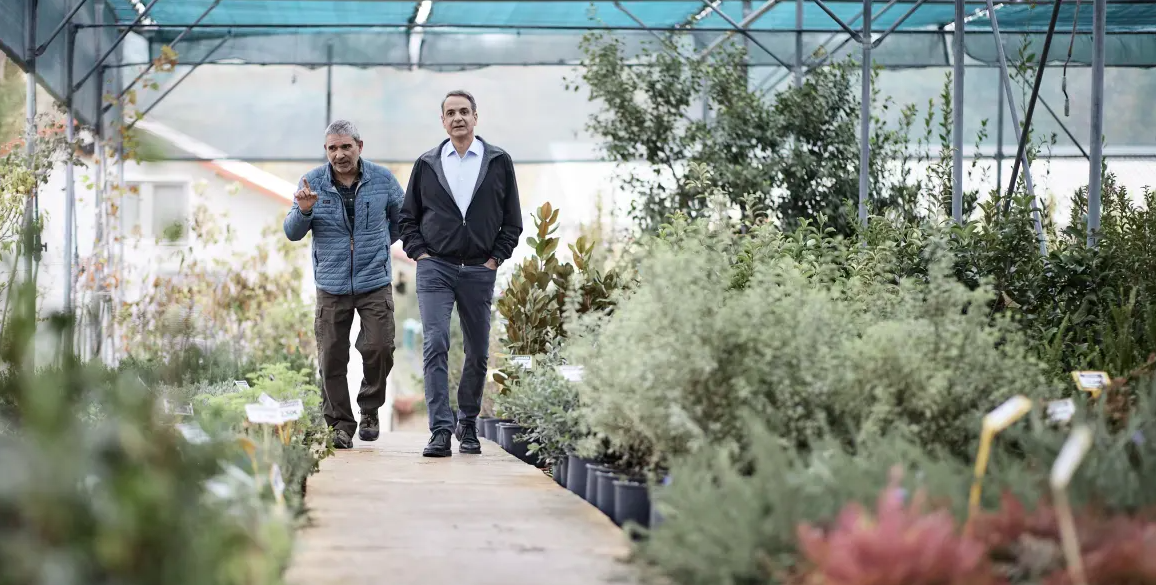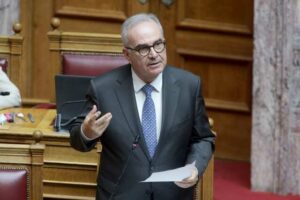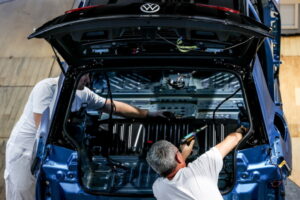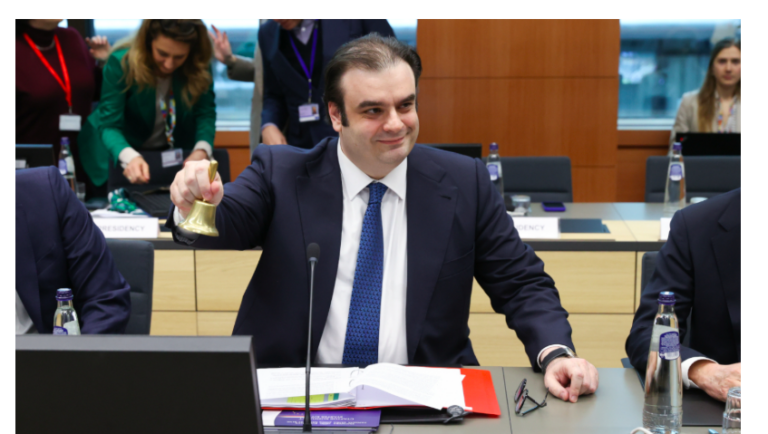Our goal is to significantly increase the area cultivated in greenhouses and other covered agriculture.
Greek Prime Minister Kyriakos Mitsotakis visited a nursery in Kapandriti in the afternoon, where he had the opportunity to discuss with farmers the government’s initiative to support greenhouse farming with a €150 million program. He also addressed other measures aimed at reducing production costs and supporting the primary sector.

“I personally believe in the potential we have to improve the productivity of the primary sector. The truth is, when they presented comparative data on the productivity of greenhouse farming versus conventional farming, I was speechless. So, I asked the Ministry to immediately initiate a targeted action aimed at building new greenhouses and refurbishing old ones,” said the Prime Minister.

“But the issue is to understand what the specifications should be. In other words, what we will build must really meet the changing conditions. We’ve also had a discussion with Piraeus Bank, which is willing to provide significant loan resources for this effort. Our goal is to significantly increase the area cultivated in greenhouses and other covered farming,” he added.

The program aims to modernize vegetable farming, both to strengthen the primary sector and to mitigate the effects of climate change. Transitioning to greenhouse production dramatically increases resource efficiency, such as water and fertilizers, extends the growing season, and better protects the crops in a controlled environment. Eligible expenses for recipients will include the construction, expansion, and modernization of greenhouse structures, land purchase, and construction of supporting infrastructure such as warehouses, as well as mechanical equipment such as hydroponic systems and heating-cooling systems.

During the discussion, the issues and challenges faced by the agricultural world were also examined, such as the shortage of workers, the cost of energy and fertilizers, and ensuring water resources for irrigation.
Labor Shortages and Agreements
Speaking about labor shortages, the Prime Minister emphasized the importance of intergovernmental agreements for seasonal labor recruitment.

“We see this problem everywhere, not just here. We already have an agreement with Egypt and are completing another with India. We want to work with countries with which we have good geopolitical relations and where we have tested workers who can generally integrate well into both professional and social life in our country, so we can solve this problem because Greek hands will not be easily found for these jobs,” said Kyriakos Mitsotakis.
“Thus, the issue for us is to quickly close agreements and then employers can more systematically find the workers they need,” he added.
Regarding energy costs, it was noted that the “GAIA” electricity pricing ensures reduced rates for agricultural connections for 2+8 years, allowing producers to better plan their operating expenses and investments.
“We’ve secured electric capacity, I’ll explain it simply, so we can give our farmers a predictable price, primarily. What matters to me is that you know that your costs for the next two years will be this, and then you will have a clearer picture,” said the Prime Minister.
“You are protected from the seasonality of electricity. The fluctuations are the worst when you want to plan. Now you know your price for the next two years. In the medium to long term, prices will drop,” Kyriakos Mitsotakis continued.
There was also an exchange of views on measures that could further facilitate the agricultural sector, such as lowering VAT on certain fertilizers, beyond those already included in the reduced 6% VAT rate.
The importance of small but effective irrigation projects was also highlighted, which could be implemented in coordination with local authorities. “We have failed as a country for decades in the proper management of water. It’s a very difficult issue. 85% of water is used for irrigation, the rest is for drinking. We will now do a job to rationalize the structure of the Water Supply and Sewerage Companies (DEYA) so that we can at least ensure they all perform similarly. Regarding irrigation, unfortunately, we are also hostage to many large projects that were completed at great cost but were never finished, and we did not pay enough attention to small projects, which, however, must be functional,” noted the Prime Minister.
Further Visit in Kapandriti
Later, Kyriakos Mitsotakis visited the central square of Kapandriti, where he had the opportunity to chat with local residents and shopkeepers. The Prime Minister also visited the Kapandriti Health Center, where renovation and upgrade works are underway. He spoke with workers and was updated on the progress of these works.
Ask me anything
Explore related questions





